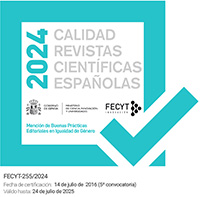The Journey to the North and the Importance of History. Blanco White’s Identities in Letters from Spain (1822)
DOI:
https://doi.org/10.5944/etfiv.29.2016.16805Keywords:
National character, Identities, Religion, NationAbstract
AbstractAt the beginning of the nineteenth-century, José María Blanco White rewrote and reconstructed his multiple identities, individual as much as collective. He tried to lay down the tale of his life, a tale that was always unsteady. This article connects his work, and especially his Letters from Spain (1822), with the European debate on national characters. To a large extent, this debate was based on an understanding of Europe in which the Mediterranean backward South worked as an opposite mirror for the modern North. Through the work of Blanco White we can analyse how this understanding influenced the way in which identities were designed and constructed in the Europe of the first decades of the nineteenth century.
Downloads
References
Alberich, José, «La España de Blanco y los viajeros ingleses», en Manuel Moreno Alonso (ed.), José María Blanco White y el problema de la intolerancia en España, Sevilla, Caja de San Fernando, 2002: 79-89.
Aradra, Rosa Mª, «Miradas literarias sobre el exilio español (1813-1833)», en José Checa Beltrán (ed.), La cultura española en la Europa romántica, Madrid, Visor, 2015: 265-289.
Arriaza, Juan Bautista, Breve registro de los seis números que hasta ahora se han publicado del periódico, intitulado El Español. Es carta de un patriota español residente en Londres a un amigo suyo en la península, Londres, Imp. Vogel y Schulze, 1810.
Bell, David A., The Cult of the Nation in France. Inventing Nationalism, 1680-1800, Cambridge y Londres, Harvard University Press, 2001.
Blanco White, Joseph, Letters from Spain, Londres, Henry Colburn &co., 1822.
—, The Life of the Rev. Joseph Blanco White, written by himself; with portions of his correspondence. Edited by John Hamilton Thom, Londres, John Chapman, 1845, 3 vols.
—, «Examination of Blanco by White», Revista de Estudios Hispánicos, 33/1 (1999): 3-40. (Edición de Ángel Loureiro).
Breña, Roberto, «José María Blanco White y la independencia de América, ¿una postura pro-americana?», Historia constitucional, 3 (2002).
Colley, Linda, Britons. Forging the nation 1707-1837, New Haven, Yale University Press, 1992.
Dainotto, Roberto M., Europe (in Theory), Durham y Londres, Durham University Press, 2007.
Durán, Fernando, José María Blanco White o la conciencia errante, Sevilla, Fundación José Manuel Lara, 2005.
Durán, Fernando, «Introducción», en José María Blanco White, Artículos de crítica e historia literaria, Sevilla, Fundación José Manuel Lara, 2010: vii-cxxxi. (Edición de Fernando Durán).
Ertler, Klaus-Dieter, «El año 1812 en la crítica de José María Blanco White», en Fernando Durán (coord.), Hacia 1812 desde el siglo ilustrado, Gijón, Sociedad Española de Estudios del Siglo XVIII-Trea, 2013: 1061-1075.
Fernández, James D., «A Life of Readings, the Readings of a Life: Joseph Blanco White», Revista de Estudios Hispánicos, 24/2 (1990): 121-142.
Fernández, James D.: «Blanco White y el género autobiográfico», en Antonio Cascales (coord.), Blanco White, el rebelde ilustrado, Sevilla, Junta de Andalucía, 2009: 93-98.
Fernández albadalejo, Pablo, «Entre la «gravedad» y la «religión». Montesquieu y la «tutela» de la monarquía católica en el primer setecientos», en Materia de España. Cultura política e identidad en la España moderna, Madrid, Marcial Pons, 2007: 149-176.
Iglesias, Mª Carmen, «Montesquieu and Spain: iberian identity as seen through the eyes of a non-spaniard of the eighteenth century», en Richard Herr y John H. Polt (eds.), Iberian Identity: Essays on the Nature of Identity in Portugal and Spain, Berkeley, California University Press, 1989: 143-155.
Kirkpatrick, Susan, «Blanco White en el confesionario», Quimera, 206 (2001): 30-36.
Lawless, Geraldine, «Opposing strategies in Blanco White’s fiction», en Daniel Muñoz Sempere y Gregorio Alonso (eds.), Londres y el liberalismo hispánico, Madrid y Frankfurt, Iberoamericana-Vervuert, 2011: 203-214.
Lloréns, Vicente, «Los motivos de un converso», Revista de Occidente, 13 (1964): 44-60.
Loureiro, Ángel G., The Ethics of Autobiography. Replacing the Subject in Modern Spain, Nashville, Vanderbilt University Press, 2000.
Moe, Nelson, The View from Vesuvius. Italian Culture and the Southern Question, Berkeley, University of California Press, 2002.
Muñoz Sempere, Daniel, La Inquisición española como tema literario: política, historia y ficción en la crisis del antiguo régimen, Woodbridge, Tamesis, 2008.
Murphy, Martin, Blanco White. Self-banished Spaniard, New Haven y Londres, Yale University Press, 1989.
Pons, André, Blanco White y España, Oviedo, Instituto Feijoo de Estudios sobre el Siglo XVIII, 2002.
Romani, Roberto, National Character and Public Spirit in Britain and France, 1750-1914, Cambridge, Cambridge University Press, 2002.
Saglia, Diego, Poetic Castles in Spain. British Romanticism and Figurations of Iberia, Amsterdam, Atlanta, 2000.
—, «Hispanism in The New Monthly Magazine», Notes and Queries, 49/1 (2002): 49-55.
Sosa-Velasco, Alfredo J.: «Blanco White entre dos mundos: retórica y confesión», Dieciocho, 30/2 (2007): 287-301.
Schwab, Christiane, «Social Criticism and Romantic Travel Writing: Letters from Spain (1822) by José María Blanco White», Castilla. Estudios de Literatura, 4 (2013): 350-367.
Simal, Juan Luis, Emigrados: España y el exilio internacional, 1814-1834, Madrid, Centro de Estudios Políticos y Constitucionales, 2012.
Tosh, John, A man’s place. Masculinity and the Middle-Class Home in Victorian England, New Haven y Londres, Yale University Press, 1999.
Wahrman, Dror, The making of the modern self: identity and culture in eighteenth-century England, New Haven y Londres, Yale University Press, 2006.
Downloads
How to Cite
Issue
Section
License
Los autores que publican en esta revista están de acuerdo con los siguientes términos:
- Los autores conservan los derechos de autor (copyright) de las obras publicadas y garantizan a la revista el derecho de ser la primera publicación del trabajo al igual que permiten la reutilización del mismo bajo la licencia de uso indicada en el punto 2.
- Las obras se publican en la edición electrónica de la revista bajo bajo una licencia Creative Commons Reconocimiento-NoComercial 4.0 Internacional, que permite a otros compartir el trabajo con un reconocimiento de la autoría del trabajo y de la publicación inicial en esta revista. Se pueden copiar, usar, difundir, transmitir y exponer públicamente, siempre que: i) se cite la autoría y la fuente original de su publicación (revista, editorial y URL de la obra); ii) no se usen para fines comerciales.
- Se permite y se anima a los autores a difundir electrónicamente las versiones pre-print (versión antes de ser evaluada) y/o post-print (versión evaluada y aceptada para su publicación) de sus obras antes de su publicación, ya que favorece su circulación y difusión más temprana y con ello un posible aumento en su citación y alcance entre la comunidad académica (por ejemplo, en repositorios institucionales o en su propio sitio web). Color RoMEO: verde. (Véase The Effect of Open Access) (en inglés).
Authors who publish in this journal agree to the following terms:
- Authors retain copyright and grant the journal right of the first publication with the work simultaneously licensed under a license Creative Commons Reconocimiento-NoComercial 4.0 Internacional that allows others to share the work with an acknowledgement of the work's authorship and initial publication in this journal.
- Authors are able to enter into separate, additional contractual arrangements for the non-exclusive distribution of the journal's published version of the work (e.g., post it to an institutional repository or publish it in a book), with an acknowledgement of its initial publication in this journal.
- Authors are permitted and encouraged to post their work online (e.g., in institutional repositories or on their website) prior to and during the submission process, as it can lead to productive exchanges, as well as to earlier and greater citation of the published work (See The Effect of Open Access).








